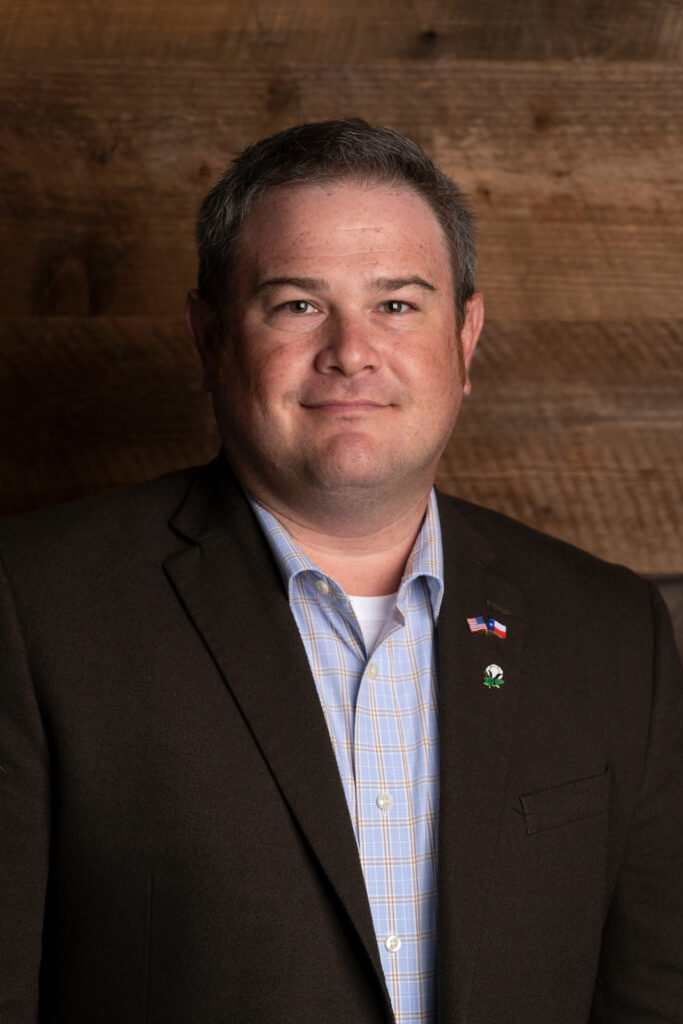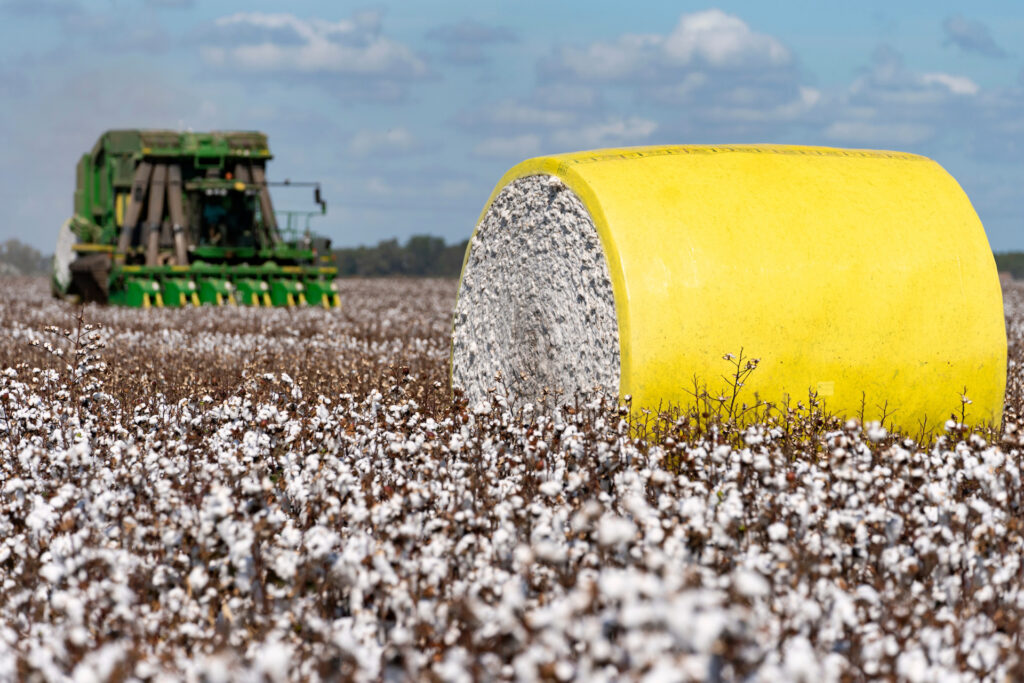Former student cultivates key role in Texas cotton production
McKnight goes from education as an agronomy student to educating as state cotton specialist
A passion for science and a drive to educate on the value of agriculture to Texas took Ben McKnight, Ph.D., from a student to a faculty member of the Texas A&M College of Agriculture and Life Sciences Department of Soil and Crop Sciences.

McKnight, originally from Leverett’s Chapel in Rusk County, earned two degrees from Texas A&M University before leaving for his doctorate and eventually returning for his career.
As the Texas A&M AgriLife Extension Service state cotton specialist for the past three years, McKnight’s job has been to conduct and translate cotton research results and provide resources specific to each region and producer’s needs.
While cotton is an adaptable crop grown statewide, from the Lower Rio Grande Valley to the Panhandle, from East Texas to El Paso and many areas in between, it is not without its challenges.
Each specific production region has unique soil characteristics and environmental conditions, which can dictate specific management decisions and practices to ensure high yields while maintaining sustainable growing scenarios.
McKnight provides leadership and coordination to the AgriLife Extension programs relevant to cotton production across the state. These programs can include grower meetings, field days, crop tours and training sessions for producers, AgriLife Extension agents and allied industry partners. He also works with those same stakeholders to identify needs for educational resources and programs and works to develop and implement the resources.
He also serves in an advisory capacity at state-level commodity organizations, provides information and state updates to national-level producer organizations, conducts applied field research trials and provides results to the public. Additionally, he provides mentorship and training to undergraduate and graduate students.
McKnight sat down with us to discuss what the path from Texas A&M student to AgriLife Extension specialist for one of the major agriculture commodities in the state looks like.
Why did you choose Texas A&M University?
As a youngster, I had a tremendous passion for science and learning about plants and animals. I attended Leverett’s Chapel Independent School District from kindergarten until I graduated high school. Even though it was a very small school, I had some incredible teachers.
To put small into perspective, my graduating class size was 10, including myself. I feel that because we had the enrollment numbers we did at the time, my primary and secondary school teachers were able to develop a unique teacher-student relationship with my classmates and I. They were able to spend more time getting to know each individual student.
During my time in high school, some of the faculty noticed my passion for science and that I also was very active in the agriculture program. It was only natural they encouraged me to consider Texas A&M following graduation, so I scheduled a visit and immediately knew this was where I needed to be.
Once I got here, I had some amazing experiences as an undergraduate and graduate student, working with and learning from some of the brightest minds in the agricultural sciences. Those experiences, along with Aggieland always feeling like home to me, put a career with The Texas A&M University System at the top of my list after I finished school.
What do you like best about being the state cotton specialist?
I have been with AgriLife Extension for a little over three years, starting my current position in April 2020. During that time, perhaps the most enjoyable aspect of my job is the people I get to meet and work with. This includes producers, colleagues, students and folks who have no ties at all to the agricultural industry. Regardless of the role, any AgriLife Extension position is going to be one where there is considerable interaction with colleagues and the public. I thoroughly enjoy meeting people, developing professional relationships and being a resource for our stakeholders to get the information they need to be successful.
Are you actively involved in conducting research?
Yes, the AgriLife Extension cotton program annually conducts several cotton variety trials in different parts of the state, along with many other research trials evaluating new and emerging products, technologies and practices. The average commercial lifespan of a new cotton variety is only three to five years before it is phased out with newer varieties. Constantly evaluating these varieties across multiple geographies is imperative to determining which varieties are going to provide the yield and fiber quality characteristics needed to keep Texas cotton producers productive and profitable.
What is a change you would like to see in the cotton industry?

A change I would like to see isn’t necessarily from within the cotton and agricultural industries, but rather from the outside looking in. The general public’s perception of agriculture is often fueled by news and information that doesn’t always provide the clearest picture or capture the entirety of modern-day agriculture and the practices that growers utilize to remain productive and profitable while providing food and fiber for a growing global population.
I can tell you firsthand that agricultural producers are the ultimate stewards of the land and the resources they use to provide the world with food and fiber. Growers understand responsible use of the land and resources is imperative to keep their operations profitable and sustainable. In my capacity as state cotton specialist, I am often interviewed by state and national media on different topics related to Texas cotton production. During these interviews I try to highlight how our Texas crop and livestock producers are leaders in employing innovative, sustainable and responsible production practices. This is a story that is not shared nearly enough with the public, and our producers deserve credit where much credit is due.
What does the path from an agronomy undergraduate student to state cotton specialist look like?
I imagine there are several different paths one could take that lead to a career as the AgriLife Extension state cotton specialist. For me, the path started by getting involved with the Department of Soil and Crop Sciences inside and outside the classroom.
In 2005, I started working for the Texas A&M Soil, Water and Forage Testing Laboratory as an undergraduate student worker. It was through this experience that I began to understand the tremendous positive impact AgriLife Extension can provide to our clientele. I had quite a bit of exposure and participation in extension programming and activities during my time as a master’s student at Texas A&M and as a doctoral student at Louisiana State University. Those experiences only strengthened my passion for taking information and innovation developed within a university system to the public.
Why did you choose to study agronomy as a student?
There is always something changing in crop production, and every year brings a new set of challenges to address to be successful. I enjoy solving problems, and there’s plenty of problem-solving opportunities in crop production, so that aspect really appealed to me when deciding to pursue an education and career in agronomy. Additionally, agricultural producers and those involved in the agricultural industries are some of the most intelligent, resilient and innovative individuals you will ever meet.
I tell growers and AgriLife Extension agents all the time that I probably learn more from them than they learn from me. A career in agronomy has certainly afforded me the opportunity to always continue learning new things, and coupled with the professional relationships and friendships that I’ve developed along the way, it has been an extremely rewarding experience.
Did the way you grew up have any influence on your decision to pursue an education and career in the agronomy field?
Absolutely it did. My grandfather was an agriculture producer, and I have aunts and uncles who still produce hay and livestock, so agriculture is in my blood. The exposure I had to agriculture from an early age, my enjoyment of being and working outdoors, along with my passion for science and interest in solving problems played a major part in steering me towards a career in agronomy.
How have the activities you were involved in as a student benefited you?
As an undergraduate student I was a member of the Texas A&M soil judging team and as a doctoral student I was a member of the Louisiana State University weed team, later serving as assistant coach. Both experiences benefited me academically, professionally and personally. Participating in activities like these provided me with an opportunity to further sharpen my skillset relevant to each team activity and take the things I had learned in the classroom and apply them in real-world situations. Plus, both activities involve competitions with other university teams, which can be a great way to meet your colleagues from other institutions and establish professional relationships. Being active with these two teams led to me meeting some lifelong friends who I keep in touch with frequently.
Do you have any key mentors?
My parents and family are the best, and they’ve played the biggest role in shaping who I am personally. Professionally, there are just too many mentors to list. Two key mentors who have probably influenced me the most are Scott Senseman, Ph.D., and Eric Webster, Ph.D.
Dr. Senseman served as the chair of my master’s graduate committee at Texas A&M. He currently serves as the associate vice president for the Division of Agricultural Sciences and Natural Resources at Oklahoma State University. Dr. Webster served as the chair of my doctoral committee at Louisiana State and now serves as an associate dean and director for the Wyoming Agricultural Experiment Station. I can’t even begin to quantify how much I learned from each of them, and how much their mentorship has shaped my professional development and career path.
What advice would you give to students interested in a similar career path?
I would encourage students to get involved with their college and department outside of the classroom. That includes getting involved with student organizations and activities, getting a student worker position with a faculty member’s program, and taking advantage of any opportunities that are an avenue for networking and additional professional development. Undergraduate students would be surprised how many opportunities may arise from being active outside of the classroom.


